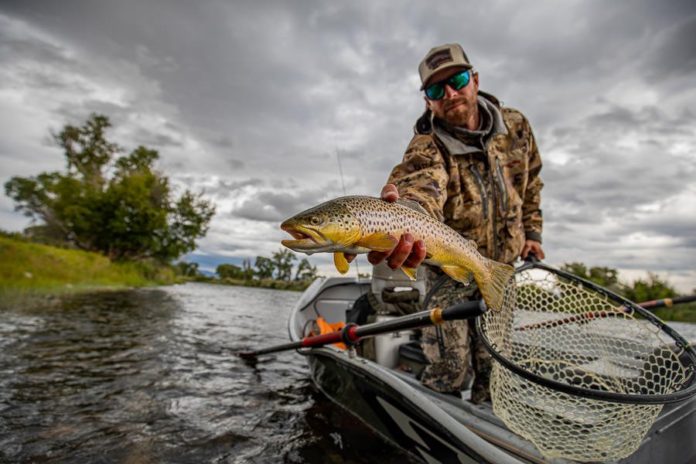Written by: The Staff of Montana Angler
Montana is home to thousands of miles of high-quality wild trout water, and it would take more than a lifetimes to fish it all. Most anglers have heard of the blue-ribbon rivers such as the Madison, Yellowstone, Missouri, Gallatin, Bighole, and so on. These larger waters deserve their famous reputations, but if you limit your time exclusively to the big rivers, you will only be scratching the surface of what Montana has to offer. On your next trip to the Big Sky state, try to check off a variety of fisheries to add diversity to your angling adventure. Here’s a sampling of what you could do if you decided to fish five different fisheries in five days to enjoy the ultimate variety that the Northern Rockies have to offer:
1. Wade a small stream
Montana’s small streams offer thousands of miles of water for adventurous anglers to explore. The diversity of smaller waters is impressive and includes cold mountain brooks, meandering meadow streams and small but fertile spring creeks. Some of the mountain streams may hold smaller trout due to their cold waters, but meadow streams are home to some surprisingly large fish. Smaller waters often receive much less pressure than their bigger and more famous brethren. Wading anglers who do their homework can find exceptional dry-fly fishing on these small waters. Venturing up a small meadow stream throwing hoppers on a warm August day is a classic experience that all fly fishers should enjoy on a trip to Montana. If you are in search of solitude and seclusion, small-stream fishing is a perfect fit. Over the years, we have found that these smaller waters often produce some of our most memorable days of the season.

2. Raft a mountain river
Montana’s highest peaks are drained by rough and tumble mountain rivers. These small and medium sized rivers such as the Boulder and Stillwater are characterized by large rock bottoms and swift currents. Needless to say, these waters are not the place for a fiberglass drift boat. While these medium sized rivers can also be waded, floating them in a 13-foot raft equipped with a fishing frame is a fantastic way to cover more water and get to more remote stretches of these rivers, far from access points. Anglers can expect miles upon miles of busy pocket water filled with a seemingly endless supply of casting targets; every rock produces the seams, slicks and eddies that trout love to hold in. Mountain rivers afford the angler the conditions to pitch large foam attractor flies out of the raft and wade-fish the abundant riffles. Although these fisheries are not quite as fertile as the larger and more famous rivers, they still host a sufficient biomass to produce decent hatches throughout the fishing season. The fish found in these waters tend to average slightly smaller than the biggest waters in the state but they can still produce some nice fish in the 17- to 18-inch range and occasionally larger.

3. Float a blue-ribbon river
The large rivers that charge down Montana’s expansive valleys, such as the Madison, Yellowstone and Missouri, are famous for a reason. Simply put, they are awesome. Every angler should get to experience a day floating one or all of these blue0ribbon rivers, which provide every angling opportunity imaginable: targeting rising fish during a hatch, nymphing productive runs, hopper fishing, and fall streamer action. One can expect to fish primarily from the boat on the largest rivers such as the Yellowstone, Missouri, and Clark Fork. On the Madison, Blackfoot, and Bighole, a blend of floating and wading is standard. While all of the largest rivers have some areas for a walk-and-wade angler, having access to a drift boat greatly increases your ability to fully unlock the complexities of these larger fisheries.

4. Switch gears on a Montana lake
Montana’s many lakes are often overlooked. If you pass up the opportunity to try one of these unique fisheries, you are truly missing out. Still waters are home to some of our state’s largest trout. The fertile ecosystems and lack of currents to fight allow trout to get to trophy size in just a few years. Lake fishing can also be highly entertaining as big trout cruise hunting for damsel flies or Callibaetis mayflies. Sight-casting to really big trout that are hunting shallow flats is really exciting. Whether you are on a 5-acre ranch lake or a 14,000-acre reservoir such as Hebgen Lake, these fertile waters are bug factories where midges, damsels, Callibaetis, leeches, and scuds abound. On calm days, the periphery of these still waters provide ample opportunities to sight-fish to cruising trout. Stripping leech, Callibaetis, and damsel patterns can provide heart-stopping grabs. Vertical fishing small insects can always produce fish, regardless of the environmental conditions.

5. Test your skill on a Paradise Valley spring creek
Southwestern Montana is home to some of Montana’s most fertile and unique fisheries, Paradise Valley spring creeks. Armstrong, DePuy, and Nelson spring creeks each offer highly technical fishing opportunities in their rich and prolific waters. The spring creeks are each fed by large aquifers near the Yellowstone River, about 15 miles south of the town of Livingston. The waters run clear year round and are filled with weed beds laden with aquatic insects. The productive waters lend themselves to thick hatches that many anglers look forward to each season. On cloudy days in the spring and fall, blue-winged olive hatches can bring up every trout in the creek. The most predictable hatch is the pale morning dun emergence, which occurs daily from mid June through most of July. PMDs provide several hours of match the hatch fishing in the late morning and early afternoon.

The true beauty of fishing Montana is the vast diversity of fishing opportunities that exist. Travelling anglers should make an effort to sample this diversity to fully appreciate the richness of the Big Sky state’s wild trout waters! Fortunately
Montana Angler is an Orvis-Endorsed Fly-Fishing Expedition based in Bozeman, Montana.
Credit: Source link































